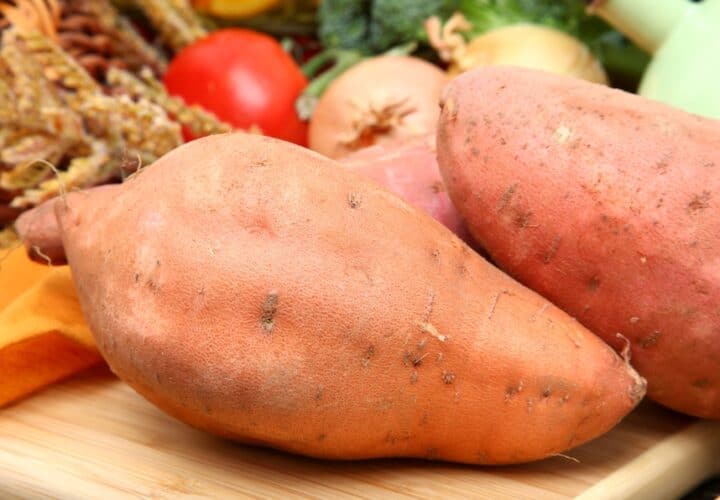In a 2018 study, scientists found that a diet high in carbs with relatively low protein improved brain health in mice.
Here’s some news you can raise a piece of buttered bread to: In a 2018 study, scientists found that a diet high in carbs with relatively low protein improved brain health in mice, raising hopes that it may also be beneficial to humans. Researchers at University of Sydney fed mice diets of complex carbohydrates from starch and casein protein, which is found in cheese and milk. Foods like bread, potatoes, rice, pasta and starchy vegetables are considered complex carbohydrates.
The researchers in this study, though, found that the mice on the low-protein, high-carb diet showed just as much improvement in cognition as mice who were given a calorie-restrictive diet, which the researchers regard as one of the most beneficial diets for longevity.
Can certain diets really prevent dementia?
First, let’s establish some ground rules about research and diets: While the science behind a diet is important to consider before overhauling your eating habits (or doubling down on them), the link between a diet or a type of food or nutrient and its impacts on dementia risk and brain health is notoriously tough to study.
In 2022, a Nutrition for Dementia Prevention Working Group made up of 27 leading researchers in the Alzheimer’s and dementia field laid out recommendations to help solidify the science around the relationship between nutritional diets and lower dementia risk. The group’s guidelines were published in The Lancet Health Longevity, where the authors also highlight the limitations of existing research.
“Many trials have not found that making people eat healthy or exercise is translating into benefits in the ways that is expected from the epidemiological research,” said Dr. Hussein Yassine, associate professor of medicine and neurology at the Keck School of Medicine of USC, said in a press release about the study’s findings. “That means either there is no causal connection, or that these studies have not been properly designed.”
Further, there is no “science” without consensus, so in order for something to be considered scientifically validated, much less “proven,” many different studies need to arrive at the same result.
To date, many studies into Alzheimer’s and dementia prevention and the diets that might yield protective results have found that diets rich in vegetables, fruits, antioxidants, fish (omega-3s) and other healthy foods have links to lower dementia risk, while red meats and high cholesterol diets or high sugar diets have the opposite.
Here’s more on what the researchers behind this study on less protein, more carbs found:
Could more carbs bring better brain health?
“We have close to 100 years of quality research extolling the benefits of calorie restriction as the most powerful diet to improve brain health and delay the onset of neurodegenerative disease in rodents,” said lead author and Ph.D. candidate Devin Wahl.
However, humans notoriously have a hard time with diets that restrict calories, he said. That’s why they wanted to look for an alternative.
“It shows a lot of promise that we have been able to replicate the same kind of gene changes in the part of the brain responsible for memory that we also see when we severely restrict calories,” said Wahl.
Researchers saw changes in the hippocampus, the memory center of the brain.
“The hippocampus is usually the first part of the brain to deteriorate with neurodegenerative diseases like Alzheimer’s. However, the low-protein high-carbohydrate diet appeared to promote hippocampus health and biology in the mice, on some measures to an even greater degree than those on the low-calorie diet,” said senior author and Professor David Le Couteur.
While it might surprise some that high-carb foods are being investigated as a healthy brain diet, Le Couteur pointed to populations in Okinawa, Japan and the Mediterranean as examples of how to consume the mix of proteins and carbs in a healthy way.
“The traditional diet of Okinawa is around nine percent protein, which is similar to our study, with sources including lean fish, soy and plants, with very little beef. Interestingly, one of their main sources of carbohydrate is sweet potato,” said Le Couteur.
The typical American diet is much higher in protein than the amount given to the mice. Humans in the U.S. consume around 100 grams of protein per day—about twice the recommended amount. Fads like the paleo diet and protein drinks have only encouraged the protein craze, according to The Hartman Group, a consumer research firm that tracks culinary habits. Sixty percent of consumers are trying to actively increase their protein intake, according to their research.
This new evidence on diet aligns with findings that show a Mediterranean diet may reduce the risk of Alzheimer’s by as much as 53 percent. It also aligns with some of the findings around ketogenic eating and brain health. But because mouse brains and human brains are so very different, results from animal studies don’t always translate to human clinical studies. That said, Wahl and team will continue to explore this area.
“There are currently no effective pharmaceutical treatments for dementia—we can slow these diseases, but we can’t stop them—so it’s exciting that we are starting to identify diets that are impacting how the brain ages,” said Wahl.





Protein Diet
Carbohydrates directly cause diabetes, dementia, cancer, heart disease obesity and obesity
Many people are sensitive to foods containing gluten and casein, which cause intestinal inflammation and permeability, and disruption of the gut microbiome. There is growing evidence that gut issues affect brain health. All carbohydrates are digested to glucose and high blood sugar levels are the main cause of insulin resistance and diabetes, which put you at risk of one of the forms of Alzheimer’s. I would be very wary of leaping onto this bandwagon. Especially as I am not a mouse 😉
Amen! 100% agree
In mice
I’m confused:
Para 1- Scientists found that a diet high in carbs with relatively low protein bettered brain health in mice
Para 3 – They found that the mice on the low-carb, high-protein diet showed just as much improvement in cognition as mice who were given a calorie-restrictive diet
Which is it? High carb low protein or Low carb high protein?????
Sorry about that — it’s been fixed.
The basic Okinawa diet being calorie restricted by definition puts the body into ketosis at least part time. How are you separating the dietary effects of these people being in mild ketosis to the effects of their otherwise high carb diet?